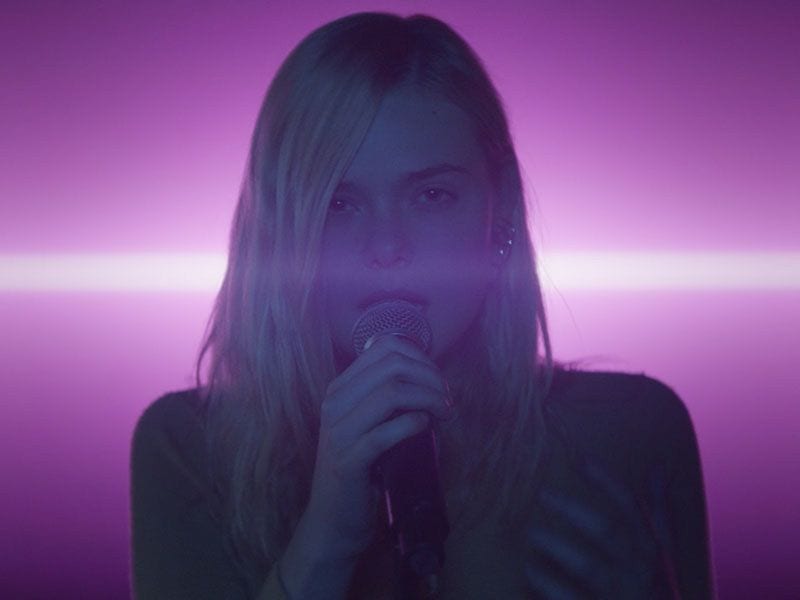Written and directed by Max Minghella (whom fans will recognize as Nick from The Handmaid’s Tale), Teen Spirit is one of several pop star movies that premiered at TIFF this year. The thing that sets Teen Spirit apart is that Elle Fanning, who plays the lead role, turns out to be a really good singer — so good that I already want the soundtrack to show up on iTunes.
Fanning plays Violet, a 17-year-old girl from the Isle of Wight, who makes money to help support her struggling family by singing cover songs in bars. Against her mother’s wishes, she secretly auditions for Teen Spirit, an X-Factor-like singing competition where the winner gets a record contract at the end. The film chronicles Violet’s journey to prepare for and compete on Teen Spirit, and it hits all the beats you’d expect it to along the way.
Like many reality stars before her, Violet knows that winning this competition could change her life by guaranteeing a kind of financial security she couldn’t hope for otherwise — and, while that mix of hope and desperation is compelling, the movie doesn’t dig into the class issues inherent in reality TV. It’s very much an uplifting Follow Your Dreams movie that tells us “Don’t give up, even when it seems like you’ve already lost,” and “Don’t be a sell-out,” and “If you try your very best, doors will always open up for you.”
Elle Fanning is a fine actor who’s more than capable of carrying the movie and, although we’ve heard her sing before in John Cameron Mitchell’s How to Talk to Girls at Parties (2017), it’s staggering to see how much personality she brings to the pop performances here. Her performance is about more than just sounding good — it’s being in the moment as a performer and managing how the character’s feelings come through, even when Violet’s deliberately trying to present herself a certain way to please the judges. The two strongest sequences in Teen Spirit are the performance Violet gives at her audition and the performance she gives in the finals, which marks the film’s climax. They both land exactly the way they’re supposed to, and they’re worth the price of admission.
In the audition sequence, Violet sings Robyn’s “Dancing on My Own” over a montage that beautifully captures the pressure of the competition, the desperation of knowing that this is her only shot at escaping the pain of her home life, and the joy and freedom of finally having the chance to do the thing that she loves best. Minghella proves himself to be an excellent music video director, and the result feels like a gut punch, in part because it takes itself seriously. There’s no suggestion that there’s anything low-brow or juvenile about what’s happening — that pop music isn’t serious enough, or that being on a reality show is embarrassing. This is a big opportunity for Violet, and we know it.
The film’s final performance is just as serious but filled with ten times the adrenaline. Fanning throws herself around the stage and screams a version of Sigrid’s “Don’t Kill My Vibe” that leaves her (and maybe us) hoarse and panting by the end. Her expression as she breathes into the microphone, not knowing how anyone’s about to react, could have been the final shot of the movie, and it’s the shot that haunts me whenever I think about Teen Spirit.
The one choice that feels “off” is Minghella’s decision to anchor the story in Violet’s relationship with her “manager” and surrogate father figure, Vlad (Zlatko Buric). There’s nothing wrong with Buric’s performance, but the character feels outdated — a funny drunk with a heart of gold that you could see as a John Candy character from the ’80s. It’s clear that Minghella knows it’s creepy for some strange man to approach a teenage girl outside a bar, claim to be a famous opera singer, and then take her to a padlocked storage shed so he can help her with her music career — which is literally what happens in the film.
Both Violet and her mother (Agnieszka Grochowska) are initially suspicious that Vlad may be a sexual predator, but it seems that the only purpose of acknowledging their suspicions is to then brush them off so that we can get on with the beautiful and unexpected friendship Teen Spirit wants this to be. At one point, Violet even tells her mother (and us) that there’s no chance Vlad’s going to assault her, because they’ve already known each other for a while and, if he were going to do it, “he would have done it already.” But that’s not how all predators work.
The stakes in the film also get confused as it rolls into its final act. The characters behave as though second and third-place contestants on reality shows are never offered record contracts. This is obviously done to set up a false dilemma where Violet either has to bet her future on winning the contest or sell out and take a deal from one of the producers. Around the same time, Teen Spirit also starts to frame Violet’s decisions as though she has a moral obligation to do what’s best for Vlad — who is supposed to be her manager if not her mentor — rather than the other way around.
Taken all together, the music video portions of the film — outstanding on their own — are dragged down by the story to create something that’s fun to watch on a Saturday afternoon, but ultimately, Teen Spirit is not all that insightful.

